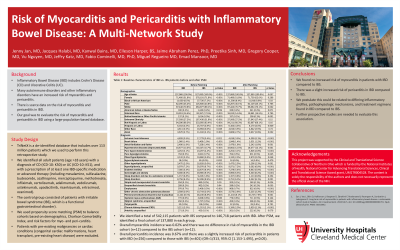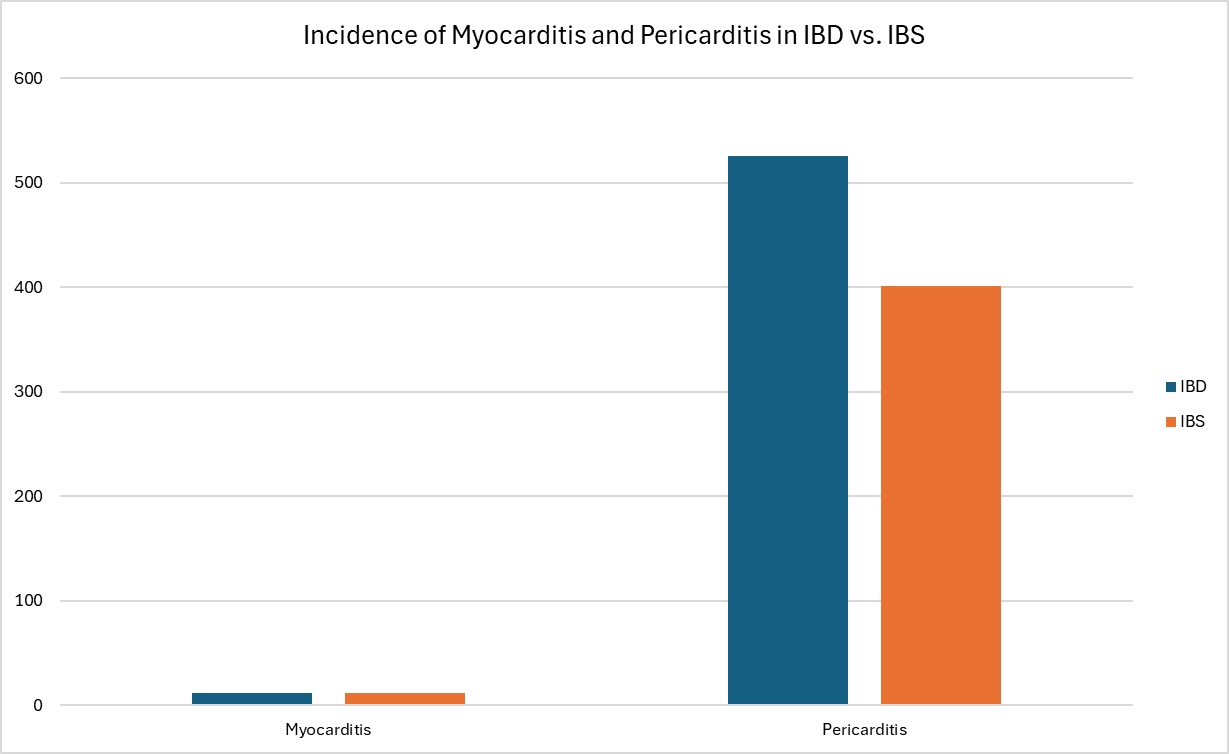Sunday Poster Session
Category: IBD
P0968 - Risk of Myocarditis and Pericarditis in Patients With Inflammatory Bowel Disease: A Multi-Network Study
Sunday, October 27, 2024
3:30 PM - 7:00 PM ET
Location: Exhibit Hall E

Has Audio
- JJ
Jenny Jan, MD
University Hospitals Cleveland Medical Center
Cleveland, OH
Presenting Author(s)
Jenny Jan, MD1, Jacques Halabi, MD2, Elleson G. Harper, BS2, Jaime A. Perez, PhD3, Kanwal Bains, MD4, Preetika Sinh, MD5, Gregory Cooper, MD6, Vu Q. Nguyen, MD, MS6, Jeffry Katz, MD6, Fabio Cominelli, MD, PhD6, Miguel D Regueiro, MD7, Emad Mansoor, MD6
1University Hospitals Cleveland Medical Center, Cleveland, OH; 2University Hospitals Cleveland Medical Center, Case Western Reserve University, Cleveland, OH; 3University Hospitals Clinical Research Center, Cleveland, OH; 4Banner - University of Arizona, Tucson, AZ; 5Medical College of Wisconsin, Milwaukee, WI; 6Digestive Health Institute, University Hospitals Cleveland Medical Center, Cleveland, OH; 7Cleveland Clinic, Cleveland, OH
Introduction: Inflammatory bowel disease (IBD), including Crohn’s disease (CD) and ulcerative colitis (UC), is associated with many extraintestinal manifestations. While associated with other autoimmune and inflammatory disorders, there is scarce and conflicting data on the risk of myocarditis and pericarditis in IBD. We sought to evaluate the risk of myocarditis and pericarditis in IBD utilizing a large population-based database.
Methods: Using TriNetX, a de-identified database collecting real-time data on over 113 million patients, we performed a retrospective study identifying all adults (aged >18 years) with a diagnosis of CD (ICD-10: K50) and UC (ICD-10: K51) and with prescription of at least one IBD-specific medication or advanced therapy. Our control group included patients with irritable bowel syndrome (IBS) (a functional GI disorder). We used propensity score matching (PSM) to balance cohorts based on demographics, Charlson Comorbidity Index, and risk factors for myo- and pericarditis (Table 1). Patients with pre-existing cardiac conditions were excluded. We studied outcomes of the incidence of myocarditis and pericarditis in IBD and IBS. Odds ratios and 95% confidence intervals were reported and p-values < 0.05 were considered statistically significant.
Results: We identified 542,115 patients with IBS compared to 146,718 with IBD. Using propensity score matching, we identified a final cohort of 137,880 patients in each group. Overall myocarditis incidence was 0.02%. There was no difference in risk of myocarditis in the IBD cohort (n=12) compared to the IBS cohort (n=12). However, while overall pericarditis incidence was 0.67%, there was a slightly increased risk of pericarditis in patients with IBD (n=526) compared to those with IBS (n=401) (OR=1.313, 95% CI [1.153- 1.495], p< 0.05).
Discussion: In this large population-based study, we found no increased risk of myocarditis in patients with IBD compared to IBS. However, there was a slightly increased risk of pericarditis in IBD compared to IBS. This could be due to the differing inflammatory profiles, pathophysiologic mechanisms and treatment regimens found in IBD compared to IBS. Further prospective studies are needed to evaluate this association.

Note: The table for this abstract can be viewed in the ePoster Gallery section of the ACG 2024 ePoster Site or in The American Journal of Gastroenterology's abstract supplement issue, both of which will be available starting October 27, 2024.
Disclosures:
Jenny Jan, MD1, Jacques Halabi, MD2, Elleson G. Harper, BS2, Jaime A. Perez, PhD3, Kanwal Bains, MD4, Preetika Sinh, MD5, Gregory Cooper, MD6, Vu Q. Nguyen, MD, MS6, Jeffry Katz, MD6, Fabio Cominelli, MD, PhD6, Miguel D Regueiro, MD7, Emad Mansoor, MD6. P0968 - Risk of Myocarditis and Pericarditis in Patients With Inflammatory Bowel Disease: A Multi-Network Study, ACG 2024 Annual Scientific Meeting Abstracts. Philadelphia, PA: American College of Gastroenterology.
1University Hospitals Cleveland Medical Center, Cleveland, OH; 2University Hospitals Cleveland Medical Center, Case Western Reserve University, Cleveland, OH; 3University Hospitals Clinical Research Center, Cleveland, OH; 4Banner - University of Arizona, Tucson, AZ; 5Medical College of Wisconsin, Milwaukee, WI; 6Digestive Health Institute, University Hospitals Cleveland Medical Center, Cleveland, OH; 7Cleveland Clinic, Cleveland, OH
Introduction: Inflammatory bowel disease (IBD), including Crohn’s disease (CD) and ulcerative colitis (UC), is associated with many extraintestinal manifestations. While associated with other autoimmune and inflammatory disorders, there is scarce and conflicting data on the risk of myocarditis and pericarditis in IBD. We sought to evaluate the risk of myocarditis and pericarditis in IBD utilizing a large population-based database.
Methods: Using TriNetX, a de-identified database collecting real-time data on over 113 million patients, we performed a retrospective study identifying all adults (aged >18 years) with a diagnosis of CD (ICD-10: K50) and UC (ICD-10: K51) and with prescription of at least one IBD-specific medication or advanced therapy. Our control group included patients with irritable bowel syndrome (IBS) (a functional GI disorder). We used propensity score matching (PSM) to balance cohorts based on demographics, Charlson Comorbidity Index, and risk factors for myo- and pericarditis (Table 1). Patients with pre-existing cardiac conditions were excluded. We studied outcomes of the incidence of myocarditis and pericarditis in IBD and IBS. Odds ratios and 95% confidence intervals were reported and p-values < 0.05 were considered statistically significant.
Results: We identified 542,115 patients with IBS compared to 146,718 with IBD. Using propensity score matching, we identified a final cohort of 137,880 patients in each group. Overall myocarditis incidence was 0.02%. There was no difference in risk of myocarditis in the IBD cohort (n=12) compared to the IBS cohort (n=12). However, while overall pericarditis incidence was 0.67%, there was a slightly increased risk of pericarditis in patients with IBD (n=526) compared to those with IBS (n=401) (OR=1.313, 95% CI [1.153- 1.495], p< 0.05).
Discussion: In this large population-based study, we found no increased risk of myocarditis in patients with IBD compared to IBS. However, there was a slightly increased risk of pericarditis in IBD compared to IBS. This could be due to the differing inflammatory profiles, pathophysiologic mechanisms and treatment regimens found in IBD compared to IBS. Further prospective studies are needed to evaluate this association.

Figure: Number of patients with myocarditis and pericarditis in IBD vs. IBS, after PSM (denominator, n=137,880 in each group).
Note: The table for this abstract can be viewed in the ePoster Gallery section of the ACG 2024 ePoster Site or in The American Journal of Gastroenterology's abstract supplement issue, both of which will be available starting October 27, 2024.
Disclosures:
Jenny Jan indicated no relevant financial relationships.
Jacques Halabi indicated no relevant financial relationships.
Elleson Harper indicated no relevant financial relationships.
Jaime Perez indicated no relevant financial relationships.
Kanwal Bains indicated no relevant financial relationships.
Preetika Sinh: Bristol Myers Squibb – Advisory Committee/Board Member.
Gregory Cooper indicated no relevant financial relationships.
Vu Nguyen: AbbVie – Speakers Bureau. Eli Lilly – Speakers Bureau.
Jeffry Katz indicated no relevant financial relationships.
Fabio Cominelli indicated no relevant financial relationships.
Miguel D Regueiro: AbbVie – Advisory Committee/Board Member, Consultant, Speakers Bureau.
Emad Mansoor: Lilly – Speakers Bureau. Takeda – Speakers Bureau.
Jenny Jan, MD1, Jacques Halabi, MD2, Elleson G. Harper, BS2, Jaime A. Perez, PhD3, Kanwal Bains, MD4, Preetika Sinh, MD5, Gregory Cooper, MD6, Vu Q. Nguyen, MD, MS6, Jeffry Katz, MD6, Fabio Cominelli, MD, PhD6, Miguel D Regueiro, MD7, Emad Mansoor, MD6. P0968 - Risk of Myocarditis and Pericarditis in Patients With Inflammatory Bowel Disease: A Multi-Network Study, ACG 2024 Annual Scientific Meeting Abstracts. Philadelphia, PA: American College of Gastroenterology.
